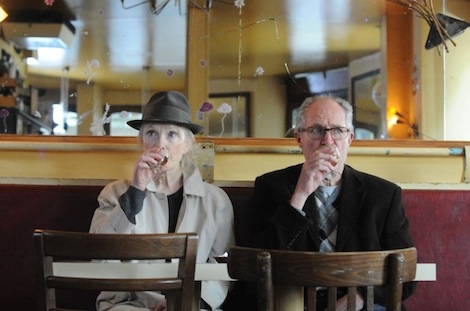Let us use the arrival of “Le Week-End”—a wistfully rendered yet often barbed account of longtime marrieds who find themselves dissatisfied and drifting apart while on an anniversary trip to Paris—to salute a filmmaker who rarely gets the credit he deserves: Roger Michell.
At 57, Michell is the youngest and most unsung of a trio of distinctively British directors whose film work began receiving global attention in the ’90s. Mike Newell made his presence known with 1994’s “Four Weddings and a Funeral”, scoring Oscar nods for best picture and screenplay. John Madden topped that feat with 1998’s “Shakespeare in Love”, winning seven Oscars including best picture. Michell’s breakout arrived in 1999, when his romantic comedy “Notting Hill” turned into one of the highest-grossing British films of all time with a worldwide box office of $364 million. His involvement, however, was somewhat overshadowed by the sight of Julia Roberts playing a version of herself as a renowned actress opposite a smitten Hugh Grant. While there have been other hits among Michell’s 11 films—his first, an adaptation of Jane Austen’s “Persuasion” in 1995, was a well-received TV movie released in theaters overseas—there also have been notable misses.
Most recently, his “Hyde Park on Hudson” was done in by the unpalatable displays of FDR’s extracurricular love life. But the biopic at least succeeded on a smaller scale as an intriguing private portrait of a public marriage. Specifically, that of an insecure King George VI (Samuel West), the stutterer who was the subject of “The King’s Speech”, and his nagging wife (Olivia Colman), the mother of Queen Elizabeth II, as they visited the president’s upstate New York retreat as World War II threatens. That royal gem of a union, as well as the interplay between West’s King and Bill Murray’s FDR, managed to save the show.
As exemplified by that effort as well as 2002’s “Changing Lanes”, a road-rage drama, and 2006’s “Venus”, about an aged actor who lusts after an insolent young woman, Michell is often at his best when dealing with characters who find themselves under stress or attempting to seek common ground with an onscreen counterpart. When Michell is on his game, as he definitely is with “Le Week-End”, he unearths small, invaluable and even profound truths about the human condition that are often as inspiring as they are devastating.
Continue reading at RogerEbert.com.



